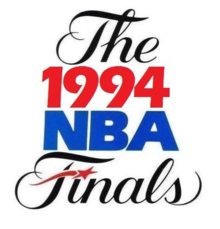
Back Finales de la NBA de 1994 Spanish فینالهای انبیای ۱۹۹۴ Persian Finales NBA 1994 French Final NBA 1994 ID 1994年NBA總決賽 Chinese
 | ||||||||||
| ||||||||||
| Dates | June 8–22 | |||||||||
|---|---|---|---|---|---|---|---|---|---|---|
| MVP | Hakeem Olajuwon (Houston Rockets) | |||||||||
| Hall of Famers | Rockets: Hakeem Olajuwon (2008) Knicks: Patrick Ewing (2008) Coaches: Pat Riley (2008) Rudy Tomjanovich (2020) Officials: Dick Bavetta (2015) Hugh Evans (2022) Darell Garretson (2016) | |||||||||
| Eastern finals | Knicks defeated Pacers, 4–3 | |||||||||
| Western finals | Rockets defeated Jazz, 4–1 | |||||||||
The 1994 NBA Finals was the championship series of the National Basketball Association's (NBA) 1993–94 season, and the culmination of the season's playoffs. The Western Conference champion Houston Rockets played the Eastern Conference champion New York Knicks for the championship, with the Rockets holding home-court advantage in the best-of-seven series. The Rockets defeated the Knicks 4 games to 3 to win the team's first NBA championship.
This matchup was Hakeem Olajuwon's second NBA Finals appearance, his other being in 1986, when Larry Bird and the Boston Celtics defeated the Rockets, four games to two. The series was Patrick Ewing's first NBA Finals appearance. The Rockets came in with strong determination to win not only the franchise's first NBA championship, but the city's first championship in a league that still existed. The Knicks, who had been recently acquired by Viacom when it bought Paramount Communications (formerly Gulf+Western), were looking to win their third NBA championship and first since 1973.
The series was hailed as a meeting of the two great centers who had previously played for a championship in college. In 1984, while Olajuwon was with the University of Houston and Ewing was with Georgetown University, Georgetown beat Houston 84–75 in the 1984 NCAA Championship game. But in this series, Olajuwon outperformed Ewing,[1][2][3] outscoring him in every game of the series and posting numbers of 26.9 ppg on 50.0% shooting compared to Ewing's 18.9 ppg on 36.3% shooting.[4] However, Ewing set an NBA finals record in the series with a total of 30 blocks, and tied the single-game record of 8 blocks in Game 5.[5] Tim Duncan later set the record for most blocks in a Finals series (2003) with 32 blocks in six games, while Dwight Howard set the record for most blocked shots in a Finals game with 9 blocked shots in Game 4 of the 2009 Finals with the Orlando Magic.
During the series, the Rockets played seven low-scoring, defensive games against the Knicks. After splitting the first two games in Houston, the Knicks won two out of three games at Madison Square Garden, which also hosted the Rangers' first Stanley Cup celebration in 54 years during the series.
In Game 6, Olajuwon blocked a last-second three-point shot attempt by John Starks that would have given the Knicks their third NBA title, instead giving the Rockets an 86–84 victory and forcing a Game 7, which made Knicks Coach Pat Riley the first (and to this date, the only) coach in a Game 7 NBA Finals on two teams, having been with the Los Angeles Lakers in 1984 and 1988. In addition, the Knicks set a record for most playoff games played in one season, with 25. The Detroit Pistons tied this record in 2005.[6] The Boston Celtics, coached by Doc Rivers, surpassed it during their 2008 championship season when they played 26.[6]
The Rockets beat the Knicks in Game 7, 90–84, enabling the city of Houston to not only celebrate its first NBA and fifth professional sports championship (first in an existing league), but also deny New York from having both NBA and NHL championships in the same year (Chicago had suffered this fate two years earlier in 1992, with the Bulls winning their second NBA championship and the Blackhawks losing in the Stanley Cup Finals). For his efforts, Olajuwon was named NBA Finals Most Valuable Player (MVP). For the Knicks, Riley had the unfortunate distinction of becoming the first (and to date, the only) coach to lose a Game 7 NBA Finals on two teams, having lost to the Celtics in 1984. It also denied him the distinction of being the first coach to win a Game 7 NBA Finals with two teams, having defeated the Detroit Pistons in 1988.
It was the first championship series since 1990 without the Chicago Bulls.
NBC Sports used Ahmad Rashad (Knicks sideline) and Hannah Storm (Rockets sideline). Marv Albert and Matt Guokas called the action.
Hal Douglas narrated the season-ending documentary Clutch City for NBA Entertainment.
- ^ Araton, Harvey (June 23, 1994). "ON PRO BASKETBALL: N.B.A. FINALS; Long-Sought Title That Ewing Needed Eludes Him Again". The New York Times. Retrieved April 1, 2008.
But he (Ewing) was just not as good as Hakeem Olajuwon, never has been.
- ^ Kalb, Elliot (2003). Who's Better, Who's Best in Basketball?: Mr. Stats Sets the Record Straight on the Top 50 NBA Players of All Time. McGraw-Hill Professional. p. 163. ISBN 0-07-141788-5.
Olajuwon clearly outplayed Ewing
- ^ "Daily Dime: Special Edition The game's greatest giants ever". ESPN. March 6, 2007. Archived from the original on March 25, 2007. Retrieved April 12, 2007.
He (Olajuwon) outplayed Ewing, Robinson and O'Neal to lead Houston to back-to-back titles...
- ^ "History of the NBA Finals: Hakeem Olajuwon: The NBA's Best In The Mid '90s". hollywoodsportsbook.com. Retrieved February 16, 2007.
- ^ "Patrick Ewing Bio". NBA. Archived from the original on February 22, 2007. Retrieved April 19, 2007.
- ^ a b Beck, Howard (June 17, 2008). "Celtics Remain Mindful Of a Missed Opportunity". The New York Times. p. D2. Retrieved June 20, 2010.